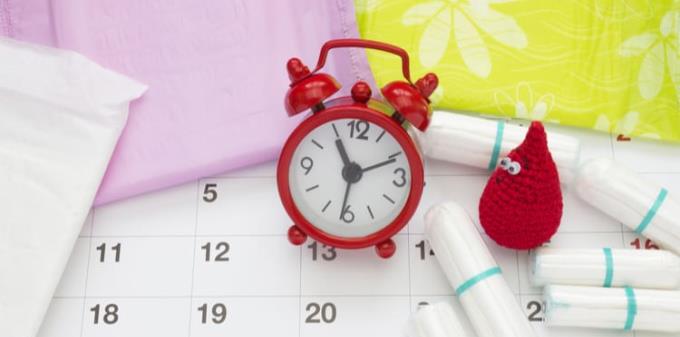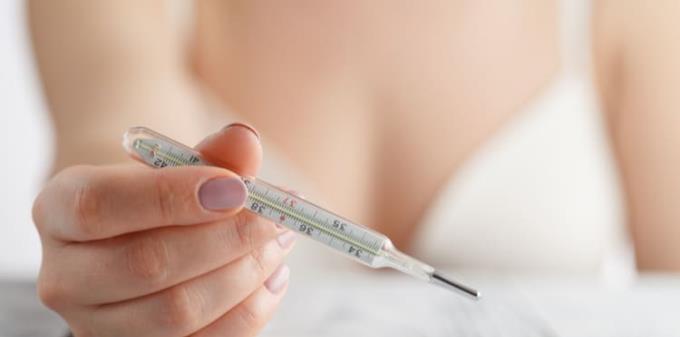You have been wanting to have a baby for a long time but have not seen any signs? Then do not ignore 10 facts that make it easier for you to get pregnant.
1. Know your own cycle

You will improve your chances of getting pregnant if you understand your monthly cycle. The warm-up phase, also known as the follicular phase, will begin on the first day you are bleeding during your period visit. When it does, the body usually releases hormones such as follicle-stimulating hormone (FSH), which causes the eggs inside the ovaries to grow. Between days 2 and 14 of the cycle, these hormones also help thicken the lining of the uterus so it is ready for fertilization .
Evolution of the process of ovulation
The average woman's menstrual cycle is 28–35 days. Ovulation will happen between day 11 and day 21 of your cycle. At that time, the Luteinizing hormone (LH) in the body is stimulated and signaled for the ripening of eggs to be released. At the same time, cervical mucus becomes slippery to help sperm meet eggs.
The final stage of the cycle
During the second half of the menstrual cycle, the hormone progesterone penetrates to help prepare the lining of the uterus to support fertilization of the egg. Eggs decompose if they are not fertilized or transplanted, resulting in lower progesterone levels. About 12–16 days later, the egg, along with the blood and tissue from the mucosa, is released from the body. This process, also known as menstruation, usually takes 3–7 days.
2. Time calculation
Women have 1–2 million eggs from birth but only release about 300–400 of them through ovulation. Normally, you will release 1 egg per month. The egg moves along one of the two tubes that connect from your ovary to your uterus. If the timing is right, sperm can be fertilized on its way to the uterus. Also, if an egg is not fertilized within 24 hours of leaving the ovary, it disappears. Sperm can live in your body for 3 to 5 days. So, knowing the time of your ovulation will help you and husband plan appropriately to increase fertility.
3. Keep track of the days of highest likelihood
The best time to get pregnant is to have sex 1 to 2 days before ovulation. If your normal cycle is 28 days, count back 14 days from when your next period arrives. Then, you should make a plan for sex these days. However, you and your partner should not "move" too constantly because science has proven that the quality of your sperm will decrease if you have sex every day.
4. Know the time of ovulation through body temperature

After the body releases an egg, the hormone progesterone is activated to make and maintain the lining of the uterus. So your body temperature will increase a little bit from normal. Using a thermometer every morning after you wake up can help you see if you are ovulating. In addition, many people easily recognize the time of ovulation by the signs : more desire, more white mucus ...
5. Predict the time of ovulation with hormones
A high level of luteinizing hormone (LH) stimulates the ripening of the egg from the ovaries about 36 hours before the egg is released. One of the ways to help you determine when you ovulate is with a test strip. Through your urine, the ovulation test will check your LH level and give you results so you can plan a relationship at the right time.
6. Body weight affects fertility
You will reduce your chances of getting pregnant if you are overweight or obese. Studies have shown that women with a higher than normal body mass index (IBM) take twice as long to conceive successfully as compared to those with a normal IBM index. Additionally, obesity can also cause infertility and low testosterone levels in men. So, if you lose 5–10% of your weight, you can significantly improve your ovulation and pregnancy rate. However, you should also have a sensible weight loss plan so that it does not harm your health or negatively affect fertility. Excessive weight loss will lead to high infertility.
7. Age affects your chances of getting pregnant
Your ability to be a mother will decrease as your age gradually increases, especially after age 30. In addition, the chances of successful fertilization by medical methods are also not effective anymore. Experts advise to see a doctor for a checkup and plan to help conceive successfully in case you are under 35 years old and tried to have a baby within the previous 12 months but failed or over 36 years old.
8. Fertility in the elderly

Studies have shown that the sperm count as well as their motility decrease as men get older, along with the ability to have sex no longer as full as before. But in fact, gentlemen can still become fathers at supposedly too great ages. If your partner is 45 years old or older, it will take longer for you two to have children than for other couples. Go to the maternity hospital for advice and effective suggestions.
Increases fertility in men
To increase the chances of both, gentlemen can apply the following methods:
Manage your stress well
Avoid excessive use of alcohol and tobacco
Weight control
Diet contains high amounts of zinc (eg meat, seafood, eggs) and vitamin E
Keep the testicles cool (a hot bath or a high temperature sauna will reduce the number of sperms).
9. Infertility treatment
There are many causes of infertility , so you and your partner should go to the hospital to be examined and find out the most accurate reason. Treatment methods of the disease include:
Use fertility drugs to increase your chances of ovulation
In Vitro Fertilisation. Your eggs are removed from the body and nourished to increase fertility and then transplanted into the uterus.
10. Signs of early pregnancy
Late period
Urinate often
Tired easily
Nausea in the morning or all day
Chest tightness.














